
Combining memoir, social science, and collected stories, author Sohaila Abdulali provides readers with a well-researched exploration of the many discursive threads surrounding rape and sexual assault. It is, quite simply, a vital piece of literature for the post #MeToo world and beyond.
All around the world, definitions differ, and coping mechanisms vary, making the topic both black and white AND full of shades of grey. The goal of What We Talk About When We Talk About Rape is not to narrow that definition. Indeed, far be it for anyone to tell someone how to respond to their own trauma. Instead, the goal is to explore the jarring impact of these mismatched ideas, of the dangers of differentiating between good girls and bad girls, and of the problems inherent in telling people how not to get raped instead of defining consent and, pretty much, just telling people not to rape. Throughout this short book, Abdulali, drawing on both her own experiences as a gang rape survivor and as former head of a Boston rape crisis centre, as well as extensive research, eloquently examines how the way we choose to talk about rape impacts our ability to understand what is happening, judge how it should be punished, and empathise with survivors.
The reality is that our general view of rape, what it is, who it affects, and who perpetrates it is so narrow, so contradictory, and so damaging that the aftermath can seem worse than the crime, with victims made to feel like they must rank their suffering against that of other survivors, or, worse still, feel that they themselves were responsible in some way. What We Talk About When We Talk About Rape rages fiercely against that, filled to the brim with stories of men and women who suffered not just during or as a result of their assaults, but also when they tried to get on with their lives after the fact. Whether choosing silence and repression or speaking out and risking everything, the evidence Abdulali has gathered is clear: the odds are stacked against survivors, and not just in the courts.
Abdulali has a wry and occasionally quite blunt sense of humour and when you’re dealing with such heavy, sensitive subject matter, it’s an absolute godsend. There are moments when you can almost picture her eyes all but rolling out of her head as she recounts some of the stories – the outcomes are, after all, what many women have come to expect, and there’s very much an attitude of ‘same shit, different day’, that will likely appeal to readers of forthright writers such as Clementine Ford and Caitlin Moran.
Oh, and speaking of shit: “Flowers grow from shit”. Ultimately, that’s the message we need to take from What We Talk About When We Talk About Rape. Not everyone survives it. Not everyone moves on. But the tales of resilience and rehabilitation that abound in this book make for an affirming exploration of refusing to let an act of sexual violence define a life. It’s a heartening counter to the often stomach-churning trauma discussed throughout, a real testament to the strength of the human spirit.
We absolutely need to talk about rape, but we also need to change how we talk about it and ensure that we wrestle control of that conversation from those who would silence victims with blame and shame. Sohaila Abdulali and writers like her are providing us with the means to do that. Pick up this book and lend a hand, won’t you?
![]()
![]()
![]()
![]()
![]()
FOUR AND A HALF STARS (OUT OF FIVE)
Sohaila Abdulali’s What We Talk About When We Talk About Rape is published by Penguin and is available now.
